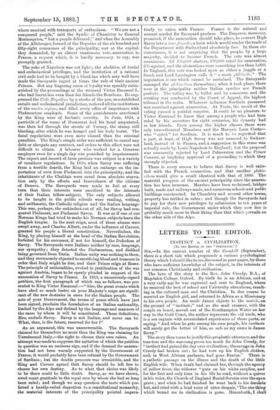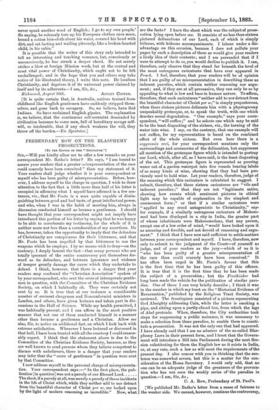LETTERS TO THE EDITOR.
INSTINCT v. CIVILISATION.
[TO THE EDITOR OF THE " SPECTAT011.1
S111,—In the current number of the Oornitill (September), there is a short tale which propounds a curious psycholngieal theory which I should like to see discussed in your pages, by those who have sufficient knowledge of the subject, in the interests of our common Christianity and civilisation.
The hero of the story is the Rev. John Creedy, BA., of Magdalen College, Oxford. , By birth he is an African, and.at a very early age he was captured and sent to England, where he received the beat of school and University educations, result- ing in the cultured man and the Christian. In due course he married an English girl, and returned to Africa as a Missionary to his own people. An uncle James objects to the match,. on the ground of " instinct ;" and as the mail steamer, with the couple on board, moved out of the Southampton Water on her way to the Gold Coast, the author represents the old uncle, who is a sea captain with accumulated experiences of those parts, as saying, "And when he gets among his own people, his instincts will Rarely get the better of him, as safe as my name is James Berry."
The story then turns to justify this prophetic utterance, and the tom-tom and the war-song prove too much for John Creedy, for "instinct had gained the day over civilisation; the savage in John Creedy had broken out; he had torn up his English clothes, and, in West African parlance, had gone Fantee." There is a pathetic passage on the illness and the death of the little English wife. When death had claimed her, through the agency of yellow fever, the widower " puts on his white surplice, and for the first and only time in his life he read, without a quiver in his voice, the Church of England Burial Service over the open grave ; and when he had finished he went back to his desolate hut, and cried with a loud voice of utter despair,' The one thing which bound me to civilisation is gone. Henceforth, I shall
never speak another word of English ; I go to my own people.' So saying, he solemnly tore up his European clothes once more, bound a cotton loin-cloth about his waist, covered his head with dirt, and sat fasting and wailing piteously, like a broken-hearted child, in his cabin."
It is possible that the writer of this story only intended to tell an interesting and touching romance, but, consciously or unconsciously, be has struck a deeper chord. He not merely strikes a blow at foreign Mission work, but at the central and most vital power of Christianity, which ought not to be left unchallenged ; and in the hope that you and others may take notice of his illustrated theory, I write this note. He localises Christianity, and deprives it of its universal power claimed by itself and by its adherents.—I am, Sir, &c., [It is quite certain that, in Australia, natives trained from childhood like English gentlemen have suddenly stripped them- selves, and gone back to savagery. So, we believe, have Red Indians. So have reclaimed English gipsies. The explanation is, we believe, that the continuous self-restraint demanded by civilisation becomes to some men, full of hereditary savage self- will, so intolerable, that if any shock weakens the will, they throw off the burden.—En. Spectator.]



































 Previous page
Previous page